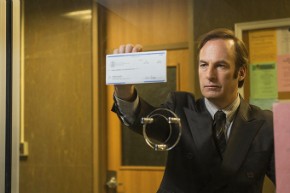Breaking better

Who do you want to be your lawyer? In the famed television series Breaking Bad, crooked lawyer Saul Goodman (Bob Odenkirk) says, “Everyone wants Atticus Finch for a lawyer. Until there’s a dead hooker in the hot tub.”
Now Goodman has his own television show, Better Call Saul, a spin-off and prequel to Breaking Bad. Six years before the opening scenes of Breaking Bad, Goodman was an Irishman named Jimmy McGill. (He changed his name and his ethnic identity because, as he says in Breaking Bad, “Everyone wants a Jewish lawyer.”) At the beginning of Better Call Saul, it is 2002, and McGill is desperate for work. His car is a horror, he sleeps in his office at the back of an Asian nail salon, and his phone never rings.
He decides to feign a crisis to stage himself as a hero. He pays a billboard worker to fake a fall and then rescues the man as he dangles from the sign. The incident is recorded on videotape and plays all over the Albuquerque media.
McGill gets work: a rancher asks McGill to help him secede from the United States but tries to pay McGill with his own self-printed currency; a dad invents a talking toilet to help his child potty train and wants help with a patent. Eventually McGill can afford to buy a suit, but his “job opportunities” grow darker and more fraught.
Read our latest issue or browse back issues.
Creator Vince Gilligan uses the new series to deepen and humanize characters from Breaking Bad. One of these is Mike Ehrmantraut (Jonathan Banks), a retired police officer who validates parking stickers at the courthouse and will never cut the perennially stickerless McGill a break. In Breaking Bad, Ehrmantraut was admired for his deadly efficiency, but he evoked little empathy. In Better Call Saul, we learn more about Ehrmantraut’s history, about the son who was killed by immoral police officers, and about his response to this crime. The story turns Ehrmantraut into an almost sympathetic character.
But Gilligan never tires of plumbing the depths of human evil by mixing crime drama with dark humor. Better Call Saul is slightly more tender in this regard than Breaking Bad, and the Horatio Alger nature of the plot makes every wrong thing that Saul does a little more understandable. But both series reflect Gilligan’s view of reality, which is often so dark that it invites not bemused cynicism but downright despair. I hate humanity a little more every time I watch. Yet the comedy and the whimsical, beautiful camera work (the New Mexico desert is almost a character in this series) keep me watching.
Jimmy McGill’s transformation (or is it deterioration?) into Saul Goodman is a moral study, albeit a twisted one. In an early episode, McGill tries to run a scam with two young skateboarders. When the scam goes awry and the boys’ lives are threatened, McGill talks their would-be murderer into sparing them. He advocates that the gangster break one leg each and let the boys go. This is the best defense of a sewer rat lawyer. He arbitrates enough to save their lives, but not enough to save their tibias.
As a lawyer for drug dealers, Goodman’s hands are never clean, but he can intervene to bring about slightly less violence. He operates with a kind of Niebuhrian ethic. Reinhold Niebuhr argued that Christians could try to keep their hands clean by abstaining from political participation, or they could get involved and try to limit the amount of violence in a troubled world. He advocated the latter stance.
In this dark parable, Jimmy McGill, Irishman turned faux Jew, demonstrates Protestant liberalism’s advocacy of political participation for the sake of relatively less injustice. It’s a dreary world out there. But at least everyone gets a lawyer.





